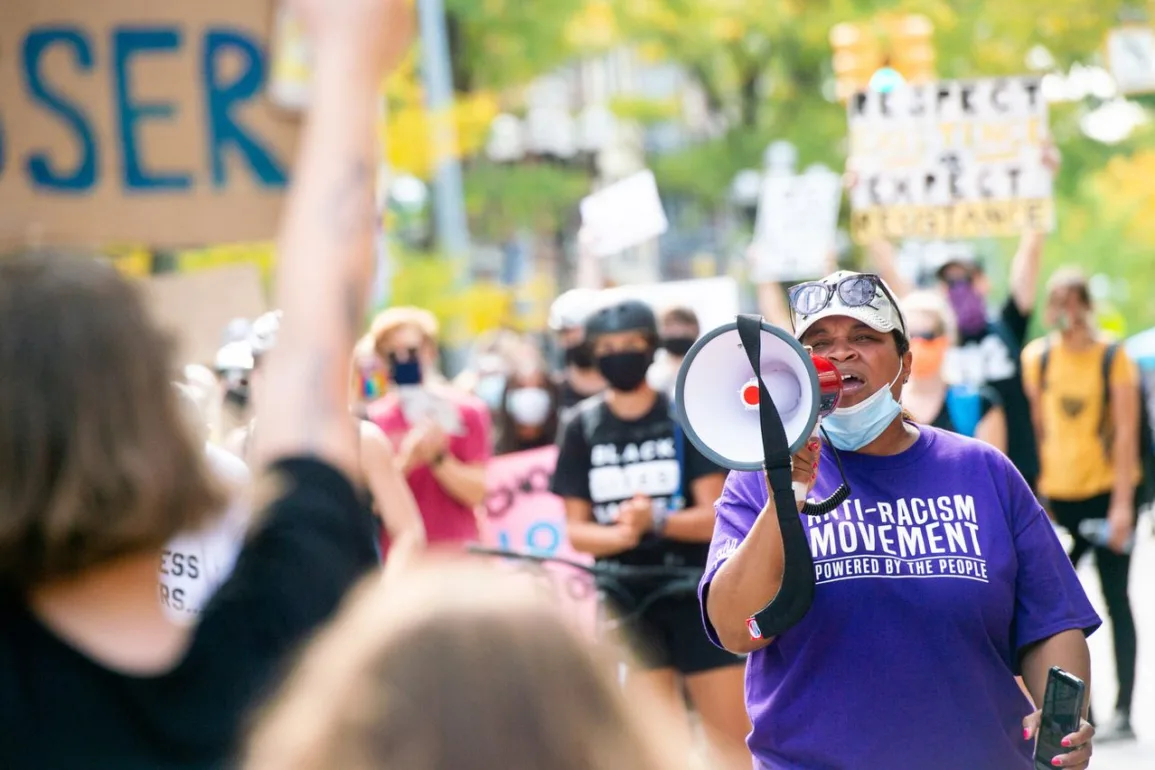YPSILANTI, MI — Ypsilanti voters could decide in 2024 if the city should pay out reparations to Black residents.
Talks of a citizen-led ballot initiative are bubbling up, with local activist group Survivors Speak aiming to put the question to voters to let the people decide.
“Right now we’re just talking, building and mobilizing the community,” said activist Trische Duckworth, the organization’s founder and executive director. “If we can make it happen in 2024, I believe that would be the time to move on it.”
Survivors Speak welcomes any group that wants to partner on the campaign, she said.
While some activists want to put pressure on Ypsilanti officials to act on reparations, Duckworth said she’d rather have the community decide the issue.
“This needs to be a ballot initiative so they can hear from the people loud and clear this is what we want,” she said. “That is our hope that we can put together a collective of people and mobilize the community so that we can get signatures, get it on the ballot and allow the people to speak.”
Survivors Speak did a survey in 2022 that showed strong support for reparations in Ypsilanti, Duckworth said.
The survey of mostly Black Washtenaw County residents and mostly Ypsilanti-area residents found 78.4% of respondents believe the descendants of enslaved Black Americans in the United States should receive reparations, while 12.5% said maybe and 9.1% said no, according to the results shared in April.
Forms of possible reparations listed in the survey include cash payments, housing down payments, neighborhood revitalization, student loan forgiveness, college tuition, business grants, childcare and health care. A majority of respondents supported all of those options and more.
“That’s why we started with the survey,” Duckworth said. “We wanted to test the temperature of the community so we could see if in fact something like that was possible.”
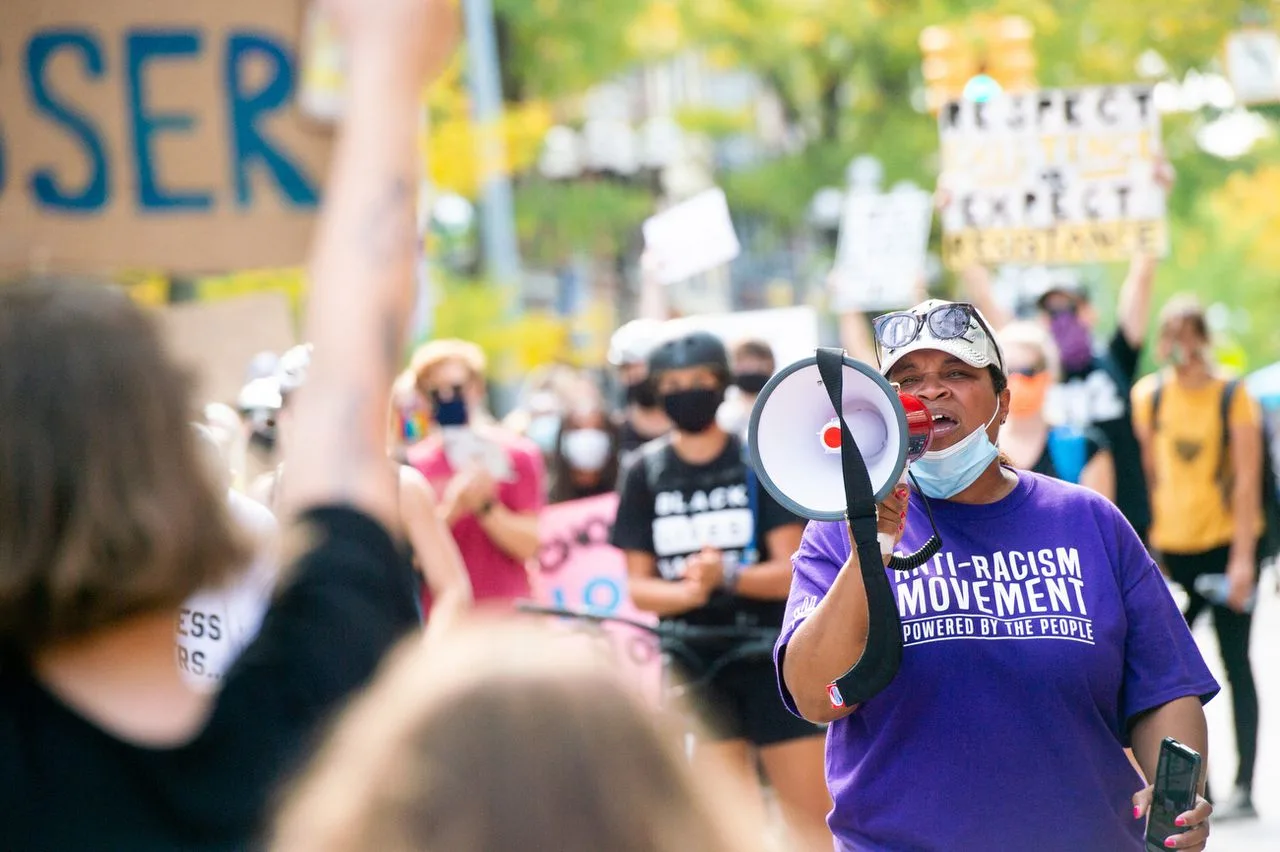
Trische’ Duckworth leads protesters down Main Street after a “Where do we go from here?” rally in Ann Arbor on Saturday, Sept. 26, 2020.
Her hope is to run a successful campaign in Ypsilanti, where Black residents account for roughly a quarter of the population, and then look next to neighboring Ann Arbor, where city leaders are talking about possible reparations as redress for harms caused to local Black families from systemic racism, including housing discrimination.
Washtenaw County leaders also are exploring the topic and are working to set up an advisory council.
“The county is doing something — that’s great,” Duckworth said. “Every municipality in America should be doing something.”
‘We actually have to heal first’
While Duckworth’s organization has its sights set on a ballot campaign, talks about reparations in Ypsilanti may reach into other arenas, too.
In May, a group including organizers affiliated with Rising for Economic Democracy in Ypsi, or REDY, organized a community forum on the topic.
“To me, part of the reason to be having this conversation is that we need to get (reparations) to just be common parlance … for people to actually be thinking about why would a government actually repair harms that they did to a population,” said Desirae Simmons, an Ypsilanti City Council member and REDY activist involved in facilitating the event.
“Personally, to get to have a real conversation with folks about what reparations is, what it looks like, is actually a healing process,” she said. “We actually have to heal first.”
The group behind the discussion is no more formal than a text thread and hasn’t defined goals beyond plans for another meeting in the coming months, Simmons said.
Part of what’s motivating the talks is to make sure Ypsilanti takes advantage of the work of the county-level reparations council, which is intended to produce a countywide plan, said Justin Harper, another organizer.
That could mean gathering local data on racial disparities in housing, health care and education, he said.
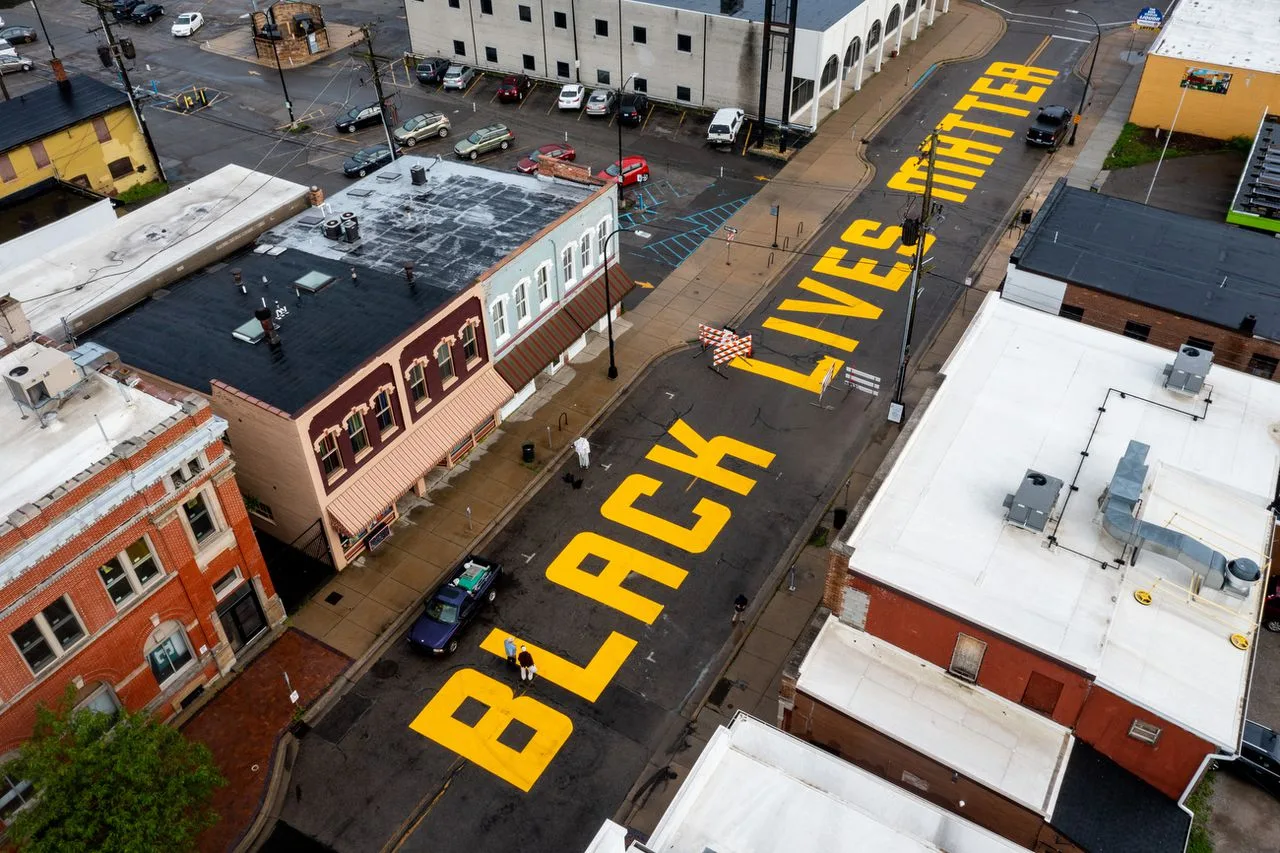
A Black Lives Matter mural is painted on South Washington Street off Michigan Avenue in Ypsilanti on Tuesday, June 8, 2021.Jacob Hamilton | The Ann Arbor News
One place where the work of repairing past harms could begin is housing, said Shannon McFall, who has participated in the discussions. Just a look at Ypsilanti today, with the most densely populated Black neighborhoods concentrated on the south side, shows the impact of redlining and racist housing policies that locked Black residents out of the wealth-generating promise of homeownership, he said.
“You can’t pull equity out of a Section 8 home. You can’t pull equity out of subsidized housing. You just can’t. And the people who are coming up today deserve those same abilities that people should have got way back when,” McFall said.
“It’s not going to be one stroke of the pen, as a lot of people think it’s going to be,” he added. “It’s a multi-generational detriment, so it’s going to be a multi-generational repayment.”
‘Flow those resources into the Black community’
Nationally, trillions of dollars in reparations are owed to Black people, Duckworth said, lamenting the harms and disadvantages Black people have faced throughout American history from slavery to today still lagging financially and in other ways.
“It has allowed us to sit in impoverished neighborhoods across this country and be subjected to poverty, which breeds gun violence, crime and everything else that we are experiencing,” she said. “They cannot keep acknowledging what was done to us as a people without following up with the repair.”
Ann Arbor neighborhood officially repeals 1947 whites-only policy
Since many Black residents and Black-owned businesses have been pushed out of Ann Arbor, Duckworth argues Ann Arbor also owes something to the citizens of Ypsilanti who work in Ann Arbor and help boost its economy.
“We are not the help, we built this country, and they should seriously be looking at how they are going to usher in reparations,” she said, arguing Ann Arbor should be looking for more ways to bring Black-owned businesses back downtown and considering other programs to help Black people.
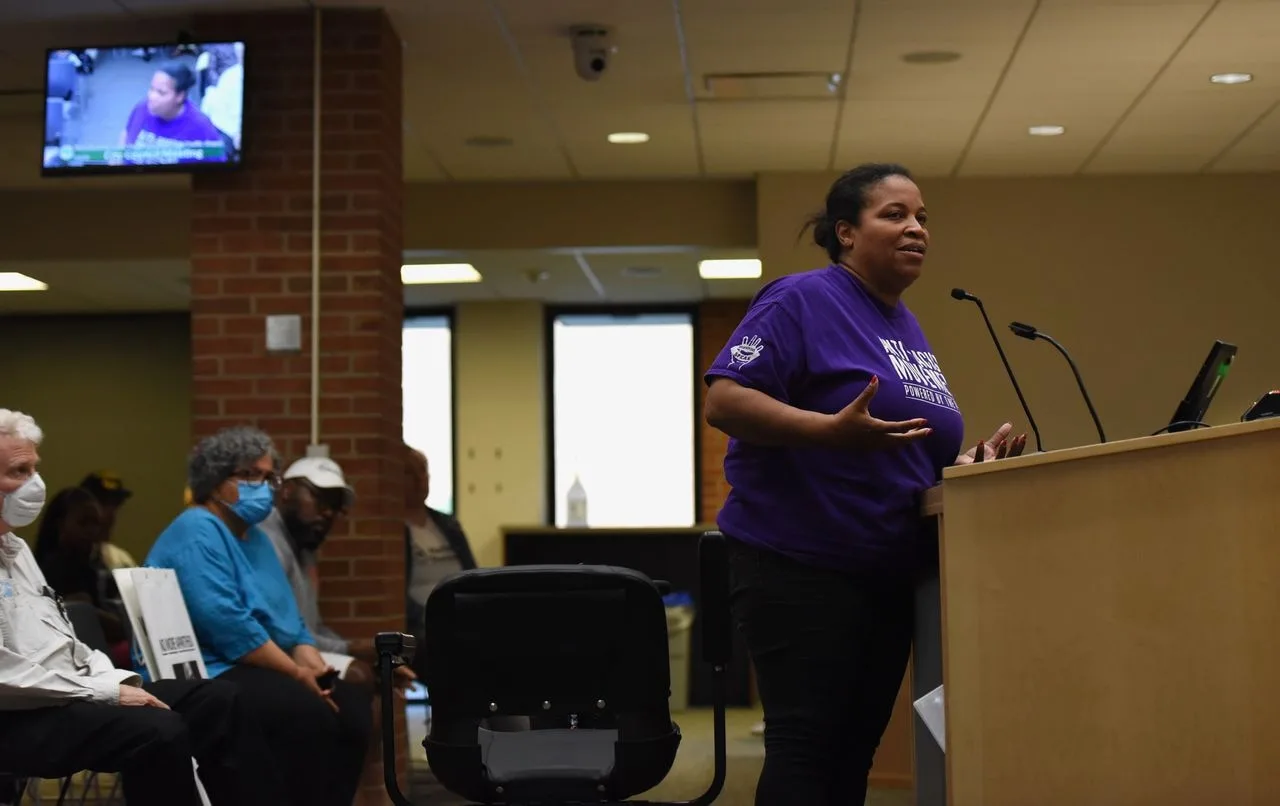
Trische Duckworth, a Black Lives Matter activist in Ypsilanti and founder of Survivors Speak, addresses the Ann Arbor City Council on July 6, 2023. (Ryan Stanton | MLive.com)Ryan Stanton | The Ann Arbor News
“The sad part is now here in Ypsilanti, we’re looking at the same thing happening,” Duckworth said of Ypsilanti growing more expensive and pricing people out.
“Now you’re paying $1,300, $1,200, $900 for a one-bedroom — how are people supposed to live like that?” she said.
In terms of any potential cash payouts Ann Arbor or Ypsilanti should offer as reparations, Duckworth is hesitant to say how much she thinks Black residents are owed.
“I don’t want to say a specific amount, because to me you cannot quantify everything that has been done to our people who have been pushed into impoverished neighborhoods,” she said.
As for where Ypsilanti could get the money for reparations, Duckworth suggests the city tap into the more than $500,000 in new annual marijuana tax revenue flowing to the city, in addition to leveraging additional funding from local dispensaries and other sources.
Reparations payouts also should come with free financial literacy programs, free bank accounts, startup money for businesses and free college education, she said.
“They need to take care of everybody’s bill,” she said. “If you are a Black citizen and you want to go to school up to a doctorate degree, your bill should be covered.”
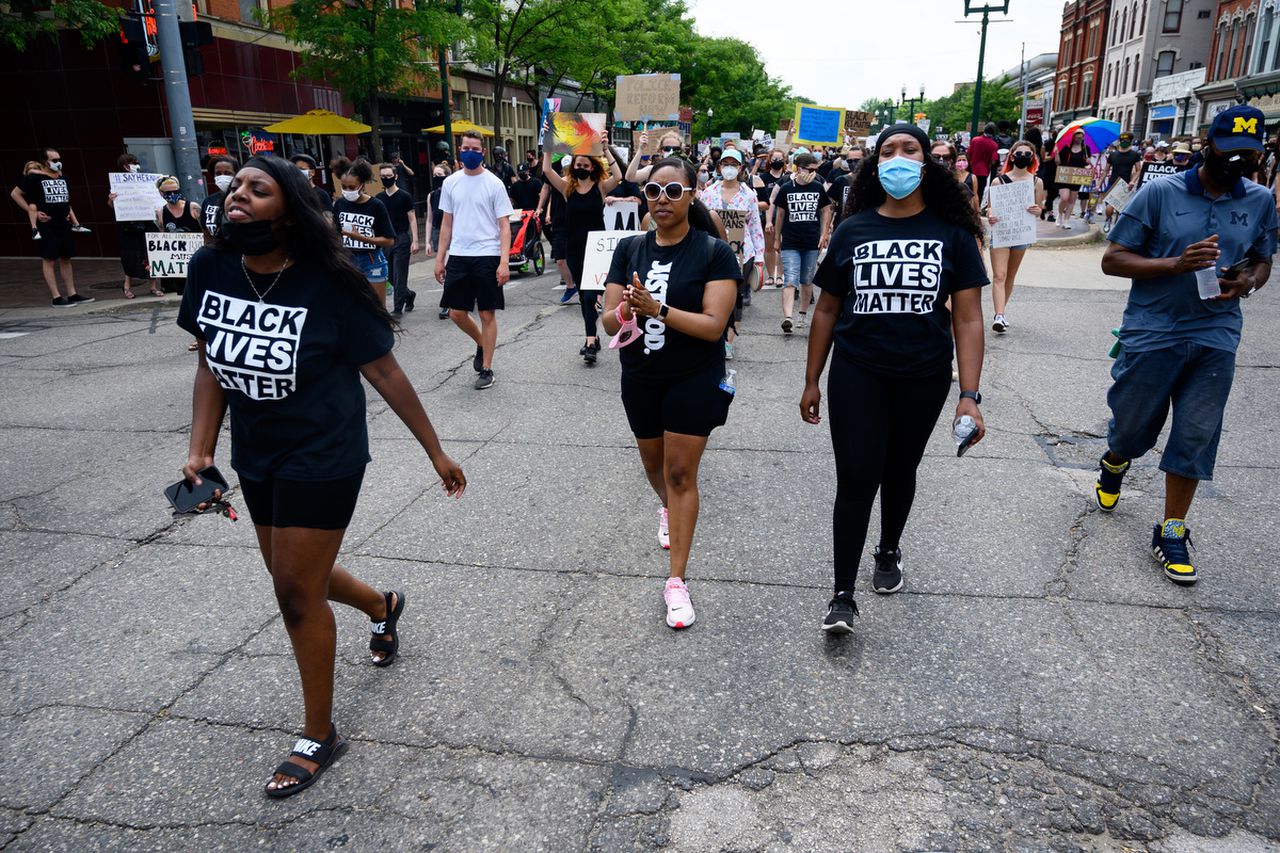
Organizers march down Michigan Avenue to the Ypsilanti Police Department during a Black Lives Matter protest in Ypsilanti on Saturday, June 20, 2020.Jacob Hamilton
It’s time to implement real solutions, Duckworth said.
“I’m tired of the studies, I’m tired of the talks. It’s time for them to put their money where their mouth is and flow those resources into the Black community,” she said. “We don’t have to have 1,000 meetings to know there’s been a lot of Black pain and we need some relief.”
Survivors Speak is now in talks with a group from Detroit and an attorney who has written ballot language to consider, Duckworth said, adding she plans to meet with REDY again soon to continue the local reparations dialogue.
Want more Ann Arbor-area news? Bookmark the local Ann Arbor news page or sign up for the free “3@3 Ann Arbor” daily newsletter.
MORE FROM THE ANN ARBOR NEWS:
What could reparations for Black residents look like in Ann Arbor? City leaders discussing
Idea of mashing together city commissions proves controversial for Ypsilanti leaders
Big elections changes will bring network of early voting sites to Washtenaw County
Should police use facial-recognition technology? Ann Arbor to vote on issue
Big raises for top officials, expansion of COVID premium pay OK’d by Washtenaw County leaders


